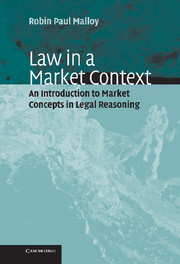Law and the Invisible Hand
A Theory of Adam Smith's Jurisprudence
$41.99 (P)
- Author: Robin Paul Malloy, Syracuse University, New York
- Date Published: November 2021
- availability: Available
- format: Paperback
- isbn: 9781108812702
$
41.99
(P)
Paperback
Other available formats:
Hardback, eBook
Looking for an examination copy?
If you are interested in the title for your course we can consider offering an examination copy. To register your interest please contact [email protected] providing details of the course you are teaching.
-
A contemporary interpretation of Adam Smith's work on jurisprudence, revealing Smith's belief that progress emerges from cooperation and a commitment to justice. In Smith's theory, the tension between self–interest and the interests of others is mediated by law, so that the common interest of the community can be promoted. Moreover, Smith informs us that successful societies do at least three things well. They promote the common interest, advance justice through the rule of law, and they facilitate our natural desire to truck, barter, and exchange. In this process, law functions as an invisible force that holds society together and keeps it operating smoothly and productively. Law enhances social cooperation, facilitates trade, and extends the market. In these ways, law functions like Adam Smith's invisible hand, guiding and facilitating the progress of humankind.
Read more- A new, contemporary, and informative analysis of the work of Adam Smith
- Advances Smith's theory of jurisprudence and demonstrates its connection to his work on economics and social progress
- Develops new insights on Adam Smith that go beyond and counter stereotypical depictions of Smith as a promotor of greed and self-interest
Reviews & endorsements
'… the book is, as a whole, both a rigorous study of the work of Adam Smith and an ambitious experiment to refect, in the thought of a master of the past, tensions and contradictions of the present.' Luca Arnaudo, History of Economic Ideas
Customer reviews
Not yet reviewed
Be the first to review
Review was not posted due to profanity
×Product details
- Date Published: November 2021
- format: Paperback
- isbn: 9781108812702
- length: 225 pages
- dimensions: 228 x 152 x 12 mm
- weight: 0.31kg
- availability: Available
Table of Contents
1. Introduction: law's invisible hand
2. Setting the stage
3. Social organization in the informal realm
4. Social organization in the formal realm
5. Integrating the informal and formal in Smith's theory
6. The spectator view
7. Judgment and justice
8. The sentiment of common interest
9. The impartial spectator, homo-economicus and homo-identicus
10. Understanding the four stages of progress
11. Adam Smith in American law
12. Parting thoughts.
Sorry, this resource is locked
Please register or sign in to request access. If you are having problems accessing these resources please email [email protected]
Register Sign in» Proceed
You are now leaving the Cambridge University Press website. Your eBook purchase and download will be completed by our partner www.ebooks.com. Please see the permission section of the www.ebooks.com catalogue page for details of the print & copy limits on our eBooks.
Continue ×Are you sure you want to delete your account?
This cannot be undone.
Thank you for your feedback which will help us improve our service.
If you requested a response, we will make sure to get back to you shortly.
×











